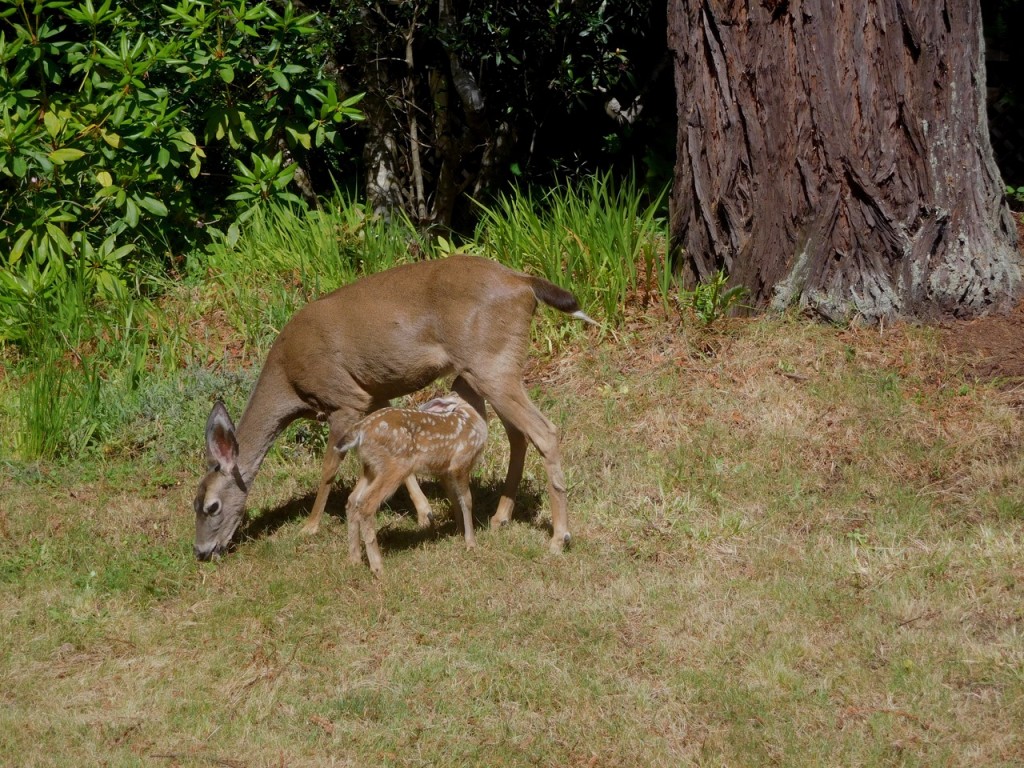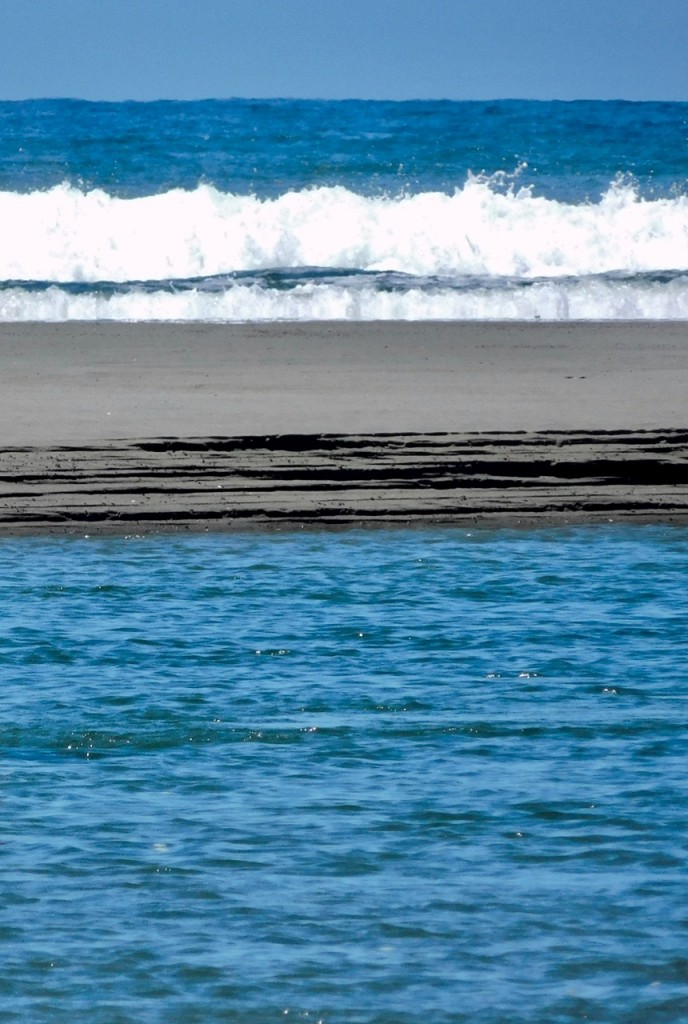Outside My Office Window
A few weeks ago, the large four-year-old doe with a nest in a remote corner of our property sauntered by the house followed by her two fawns—our first glimpse of her babies. Nature makes baby mammals extra cute for some reason, or humans think baby mammals are cute for some reason. In any case, the baby deer struck me as ultra-cute. And small. I marveled at their smallness.
Then at dusk a few days later, I looked up from my desk and saw two fawns running by, only they seemed much smaller and cuter than I remembered them being. These were micro fawns. Or was I mistaken? Were these the same fawns appearing smaller in the last light of day, or different fawns? And were they cuter or just smaller? Is cuteness a function of smallness?
Another day passed, the young doe paraded by, and coming along behind her were two enormous fawns, enormous compared to those micro fawns I thought I’d seen. And then that afternoon, the mystery was solved. The oldest doe hereabouts, a deer at least nine-years-old with a badly deformed mouth, trudged by followed by those two micro fawns, and I realized that their smallness and ultra-cuteness were probably due to the old doe not being as viable a mother as the big healthy young doe, which means these tiny fawns might not make it through the summer for lack of nourishment and being easy prey for predators.
But maybe the micro fawns will survive the summer and winter and mature into small deer who live for ten or twelve years until the natural ends of their lives, just as there are small humans and small banana slugs and small heads of lettuce and small carrots. Sometimes things come out smaller than the same kinds of things that come out larger.
In any case, we currently have four super cute fawns gamboling around the property these days, and every time I see them, I marvel at their cuteness and their obvious delight in being alive.
Speaking of rebirth, we recently had a visit from the piano technician Michael Hagen. He came all the way from Rohnert Park to Mendocino and spent thirteen hours over two days regulating and voicing the fifty-year-old grand piano we bought from our friend Carolyn. I spent most of those thirteen hours watching Michael work on the piano, and I marveled at his mastery of the complex process. The result of his mastery, which I am tempted to call wizardry, is the rebirth of our piano.
When I first sat down to play our newly regulated and expertly voiced beauty, I was wholly unprepared for how easy she was to play and how gorgeous she sounded. The keys no longer impinged on each other, the overly bright jangly tones were gone, and gone was the resistance to my light touch. I stopped playing after just a few minutes because my brain was having a hard time reconciling this mellow nuanced instrument with the obstreperous old cranky thing I’d been trying to get used to.
In other rebirth news, to celebrate the Summer Solstice, I walked to town via Big River Beach and found the beach completely different than it was just a few days before the solstice. Well, not completely. The far inland reaches of the sand will remain unchanged until next winter’s storm surfs reach those inland expanses and shift the many massive logs around, carry some logs away, and add new ones to the collection.
But the bulk of the beach was transformed. This is the glorious nature of our beach—a swiftly flowing tidal river conspiring with the high and low tides to reshape millions of tons of sand every twenty-four hours—a creative fun fest for the forces of nature. As of today, the river has carved two distinct routes to the sea, this split of the outflow and inflow causing all sorts of new shifts in the sand mass—a brand new landscape every day.
Speaking of brand new, having recently taken up the guitar again after a ten-year hiatus, I find myself playing several seriously groovy songs I wrote long ago and never recorded, and I’m so curious about why I didn’t record these groovalicious tunes when I was so zealously recording songs ten years ago.
My current theory is that I didn’t record these catchy tunes because the time was not right. Is the time right now? Or has the window of viability closed for my songs composed in the 1970s, 80s, 90s, and early 2000s? Isn’t a great song or book or movie or play timeless? Maybe not. Maybe there is Art of the Moment and Art For A Generation and Art To Last Three Generations and Art To Last A Thousand Years.
What if artists are merely pawns of the unseen creative forces of universe? What if these groovy songs were given to me to record, but only when the universe wants them recorded? What if the universe is waiting for me to be whoever I am at the moment of the recording, if that recording ever happens? Why do we do the things we do when we do them?
Speaking of when we do things, we recently watched the movie Big Night again, one of my all-time favorite movies, and not having seen Big Night since 2006, I worried the opus might have fallen into the Art of the Moment category and would fail to pass the test of time.
But I’m happy to report that for my taste Big Night is better and more pertinent today than it was when it came out in 1996. To say they don’t make movies like Big Night in America anymore is a humongous understatement. This is a classic European film made by Americans in America—the pace, the dialogue, and the unfolding of the story and relationships languid and lovely and astute and complex—a rare dramatic comedy.
When I lived in Berkeley circa 2001, I was introduced to a woman at a party, we liked each other immediately, and when a fellow came by with a tray of hors d’oeuvres—scallops in mint sauce—we each took one. Delighted by the delicious comestible, I couldn’t help referencing a scene from Big Night by saying with my best Italian accent, “That was so good, I have to kill myself.”
“My favorite movie,” said the woman, gasping in delight. “I’ve watched Big Night dozens of times with my kids. We know every line by heart. We act out the scenes when we cook dinner and breakfast. And next year we’re going to Italy on our Big Night tour.”
“A Big Night tour? What’s the itinerary?”
“Bologna, of course,” she said, her eyes aglow. “Where the food is so good you have to kill yourself, Rome, and…”
I don’t remember what else she said, but I will never forget her wild joy.




